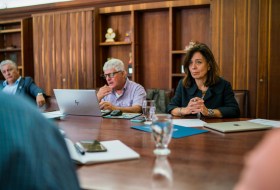News
Graduate programs with standards of excellence and high quality: Doctorate in Environmental Sciences received a visit from academic peers.
In order to verify the quality standards of the Doctorate in Environmental Sciences at Alma Mater Caucana and thus obtain High-Quality Accreditation, Unicauca received a visit from academic peers designated by the National Accreditation Council (CNA) from August 1st to 3rd.
The Doctorate in Environmental Sciences was established in 2009 as an initiative by the GEA Research Group (Environmental Studies Group), with the firm purpose of developing interdisciplinary strategies to study the environmental dimension from different perspectives and understand environmental issues in various territories. The mission is clear: to be capable of making significant contributions towards sustainable development. Similarly, the doctorate aims to generate knowledge through the society-nature relationship, consolidating diverse knowledge, perspectives, and theoretical and scientific approaches to solve environmental problems. Additionally, it aims to promote the search for methodologies and tools that enable transformations through reflection, complex thinking, and interinstitutional cooperation.
Therefore, the Doctorate in Environmental Sciences has a significant impact and relevance in our environment and an undeniable importance for the future generations, hence the ethical commitment assumed by our University to provide high-quality education, complying with established standards and norms. This has been a rigorously driven effort for over a decade, as expressed by Professor Apolinar Figueroa, Coordinator of this postgraduate program: 'This has been a 14-year process where we have formulated projects, obtained funding, made agreements, met academic peers from different parts of the world with whom we have shared experiences. Following that, we have structured the curriculum, trained students, conducted courses, and developed a working philosophy, a way of seeing the world, working systematically to engage with communities through research projects aimed at contributing to the development of the southwest.'
On the other hand, Alexander Buendía, Director of the Center for Quality Management and Institutional Accreditation, explains how we prepared for the visit from academic peers: 'There are two types of preparation for visits from academic peers. First, there is the daily preparation of doing things well and as best as we can as an institution, but the concrete process begins long before, as a Program Accreditation Committee is formed, which conducts a self-assessment exercise based on the indications of the National Accreditation Council (CNA), and based on the results of the self-assessment, a review is requested.'
Once this visit, led by the leaders of the Doctorate and accompanied by the Center for Quality Management and Institutional Accreditation and other university authorities, has been attended to, we await the evaluation results from the peers. We hope, in due course, to share the good news.
This underscores the commitment we assume as an institution and the efforts made within our programs to meet established quality standards. It is only in this way that excellence and solidarity can be achieved through the training of professionals who significantly contribute to transforming their environment, capable of conducting high-level academic research and making a difference in vital areas such as Environmental Sciences. Therefore, for those among our readers interested in this field of knowledge, we await you as future doctoral candidates.
With doctoral training, we transform the future!


